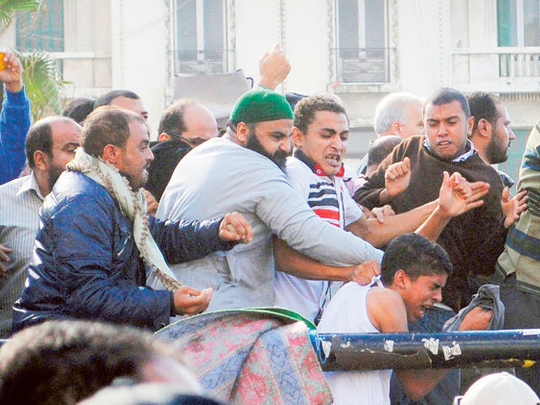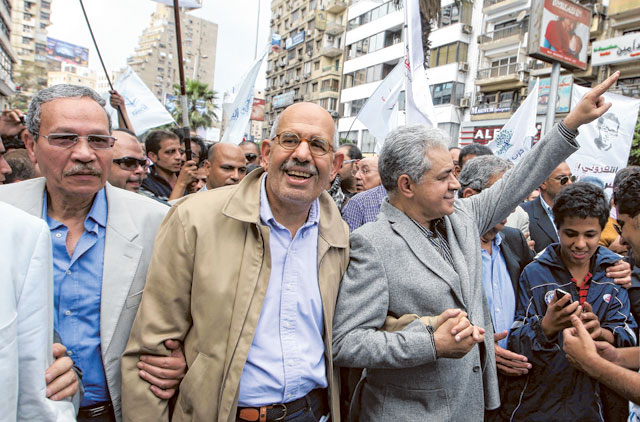
Cairo: A month after his aborted bid to axe the country’s top prosecutor, Egyptian President Mohammad Mursi has set the scene for a fresh showdown with the judiciary by issuing constitutional decrees slammed by the opposition as a “coup against legitimacy and democracy”.
In a declaration on Thursday, Mursi replaced the unpopular Prosecutor-General Abdul Majid Mahmoud, whom he had unsuccessfully tried to sack last month.
Mursi, who holds the legislative power, has made all his decisions and says the law is “final and cannot be challenged in any way”, drawing criticism of granting himself sweeping powers.
Samir Morqos, a Christian advisor to Mursi, said on Friday that he was resigning in protest at the “surprising” decrees.
“I have decided to resign because the president and presidential officials did not inform me of anything about these decrees before they were announced,” Morqos told the online edition of the state-owned newspaper Al Ahram. “I learnt about them from television.”
In Thursday’s declaration, Mursi said the constituent assembly drafting a new constitution is immune to dissolution, a decision that comes two weeks before the country’s top court was to rule on its legality.
Several secular-minded members have already quit the assembly, accusing its Islamist majority of seeking to produce an ‘Islamised’ constitution. Representatives of Egypt’s three churches and the independent Press Syndicate have also withdrawn.
A presidential decree has given the assembly an extra two months to do its job, which means it will now end in February instead of December.
“What you did today [Thursday] is invalid and requires accountability for attacking the power of law,” said Ahmad Al Zend, the head of the independent Judges’ Union, addressing Mursi at a press conference.
Al Zend, an outspoken critic of Mursi and the Muslim Brotherhood, described the president’s decrees as a “coup against constitutional legitimacy” and called for a crisis meeting of judges on Saturday to discuss Mursi’s decrees, amid reports that judges may decide to go on strike in protest.
Meanwhile, the chief judge of the Supreme Constitutional Court, Maher Al Beheiri, has said the tribunal would go ahead with hearing lawsuits requesting the dissolution of the constituent assembly and the Islamist-dominated upper house of parliament on December 2.
Since taking office in late June, Mursi has developed uneasy relations with the judicial authority. He infuriated them in August when he ordered the reinstatement of the lower house of the parliament, controlled by his Muslim Brotherhood group, almost two months after the Supreme Constitutional Court had invalidated it. He later backed down.
Last month, Mursi triggered another showdown by ordering the sacking of Mahmoud and appointing him as an ambassador to the Vatican. However, a defiant Mahmoud kept his post due to support from judges and lawyers. Mursi backed down again.
Nobel Laureate Mohammad Al Baradei has accused Mursi of appointing himself a new pharaoh by issuing the new decrees. “Mursi has blown up the concept of the state and legitimacy. The revolution has finished until a further notice,” Al Baradei wrote in a tweet, referring to a popular revolt that forced former president Hosni Mubarak to step down more than a year ago.
In an apparent bid to win over young revolutionaries, Mursi also on Thursday ordered the retrial of officials from the former regime who have already been acquitted of involvement in killing protesters during the anti-Mubarak revolt.
He then ordered monthly stipends be offered by the state authorities to families of protesters killed or injured in the protests against Mubarak and the military who took over after him.
Mursi’s Islamist allies have lauded his decrees as “revolutionary” and held massive rallies to show support.
“These decrees have fulfilled many of the revolution’s demands by ordering the retrial of the revolutionaries’ killers, providing care for the martyrs’ families and purging the judicial authority,” said Mahmoud Ghuzlan, the spokesman for the Brotherhood.
“Those opposing these decrees sell out the martyrs’ blood. The self-styled elite have no idea about the people’s aspirations and are working for their own personal interests.”
The main points
Egyptian President Mohammad Mursi expanded his authority on Thursday in a startling power grab that weakens the courts and frees him from judicial oversight amid deepening political intrigue in the Arab world’s most populous nation.
Thursday’s move effectively makes Mursi, who already holds executive and legislative powers, the ultimate force in a country that has no parliament and has yet to draft a new constitution.
Mursi granted himself full legislative powers in an August constitutional decree but has used them sparingly. The People’s Assembly, which would normally pass legislation, was dissolved by a court decision in June.
Thursday’s decrees make the constitutional assembly immune from dissolution, 10 days before the Supreme Constitutional Court was due to hear an appeal against it.
The decree appeared to remove any uncertainty still hanging over the fate of the assembly writing the constitution. The body has faced a raft of legal challenges from plaintiffs who dispute its legality. The decree also gave the body an additional two months to complete its work, meaning the drafting process could stretch until February, pushing back new elections.
Mursi ordered the establishment of specialised courts and a “defence of the revolution” prosecution service to try offences against revolutionaries as well as acts of corruption by officials of the regime of former president Hosni Mubarak. The new courts will be empowered to retry persons already cleared of attacks on demonstrators during the protests that brought down Mubarak — if “new circumstances” come to light.
Mursi already has both executive and legislative powers since the dissolution of the parliament’s lower assembly, and has now added what appears to be a monopoly of judicial authority, placing himself beyond the courts while appointing a hand-picked prosecutor without consultation.
The decree stated that all decisions taken by Mursi until the election of a new parliament were exempt from legal challenge.
In particular, critics point to Article 6, which states that the “president may take the necessary actions and measures to protect the country and the goals of the revolution” and places the president as the sovereign of the state, as he can “claim exception against all rules”. Some compared it to Anwar Sadat’s use of a similar measure in 1979 which was used against opposition figures.












